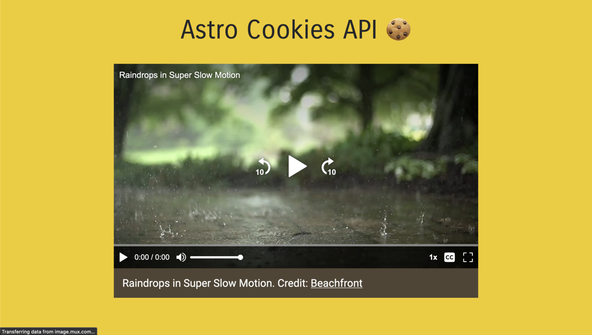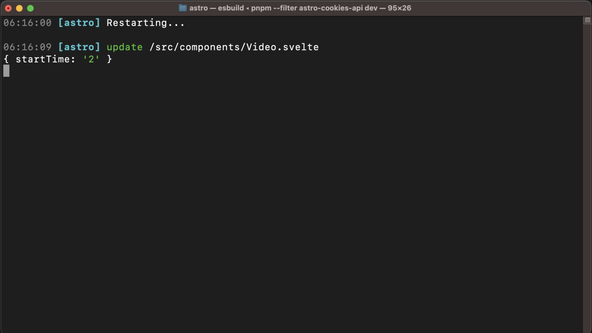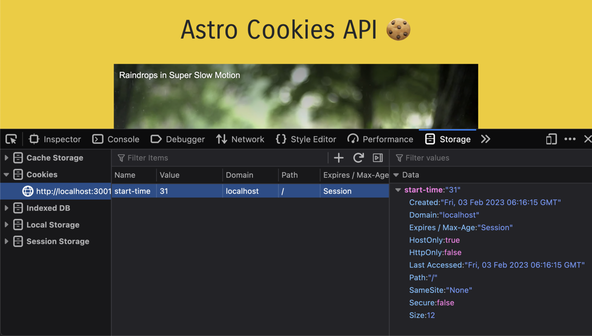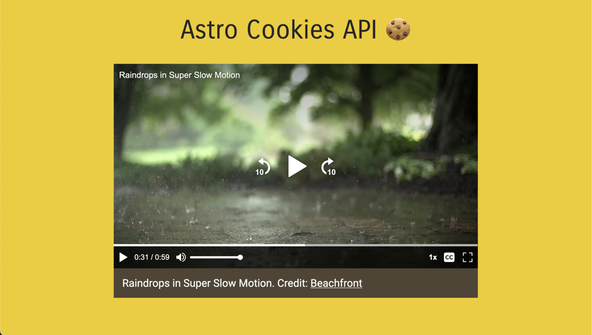🚀 Astro Cookies API #
The Astro cookies API provides a way to pass data between the user browser, and server. You can use it on your SSR sites, as an example, to keep track of whether a user is authenticated. Essentially, the API is just a wrapper for JavaScript and browser APIs which let you set cookies on HTTP requests by adding a cookies header. That said, the standard APIs have a little boilerplate code and the Astro Cookie API will save you some typing!
To see how the API works, we will look at an example with the Mux video player. We will see how you might save the video playback position using cookies. This could be used to let a logged-in user resume a video from the right place even if they switch device. The main goal here is to show how the API works, and you can adapt the code we see to work with HTTP cookies in many use cases.
For some cookie use cases, you can manage cookies just on the client side with JavaScript APIs. We focus on using cookies in HTTP requests between client and server.
🧱 What are we Building? #
We will set up a video with Mux video player in an Astro SSR app. In the video component, we will use browser APIs to let us know when the user pauses playback. We then send the playback position to our API endpoint where we can save it to a database ready for the user’s next login. In the API endpoint, we will also set the cookie with the playback position using the Astro Cookie API, of course! Finally, in our Astro client code we will have a check for the playback position cookie and pass any value to the video player component.

If that sounds like what you were looking for, then why don’t we get started? We won’t build the app step-by-step, but there is a link further down the page to the full project code on GitHub. You will need a Mux account (and to upload some video) to try out the full code, and you can do this for free.
🎥 Mux Video Player Component #
We are working in Svelte here. This makes it easier to load the Mux player script tag, and also to access the embedded video element APIs.
1 <script lang="ts">2 let {3 videoId = import.meta.env.PUBLIC_MUX_PLAYBACK_ID as string,4 title = 'Raindrops in Super Slow Motion',5 startTime = '0'} = $props();6 7 const siteUrl = import.meta.env.PUBLIC_SITE_URL;8 9 let playerElement: HTMLMediaElement=$state();10 11 async function handlePause() {12 const currentTime = Math.floor(playerElement.currentTime);13 fetch(`${siteUrl}/api/player?startTime=${currentTime}`, {14 method: 'POST',15 });16 }17 </script>18 19 <svelte:head><script src="https://cdn.jsdelivr.net/npm/@mux/mux-player"></script></svelte:head>20 <figure>21 <mux-player22 bind:this={playerElement}23 playback-id={videoId}24 stream-type="on-demand"25 {title}26 disable-cookies27 start-time={startTime}28 ontimeupdate={() => {console.log(Math.floor(playerElement.currentTime))}}29 onpause={handlePause}30 ></mux-player>31 <figcaption>32 {title}. Credit: <a href="https://www.videvo.net/profile/Beachfront">Beachfront</a>33 </figcaption>34 </figure>35 36 <style>37 mux-player {38 display: flex;39 max-width: var(--max-width-full);40 aspect-ratio: 16 / 9;41 }42 </style>
We are using a couple of MediaElement API events here. onTimeUpdate (line 28) tracks playback, letting us know
the video is actually playing. We just console log the currentTime here and include it for reference. We do use the onPause event (line 29) however. As you might
expect, this causes our handlePause function to
be invoked when the user taps the pause button. The current time has millisecond
precision, which is probably a little more precise tan required here. We use Math.floor to truncate the value.
The other thing to note is using browser APIs, we can set the playback start
time and do so in line 27, This will be passed
in when we create an instance of this component later.
In the handlePause function, we use fetch to send a POST HTTP request to our own endpoint
with the currentTime as a URL-encoded string. Let’s look at that endpoint
code next.
▶️ Astro Cookies API: Player Endpoint #
This code listens for HTTP requests on the http://example.com/api/player.
1 import type { APIRoute } from 'astro';2 3 const siteUrl = import.meta.env.PUBLIC_SITE_URL;4 5 export const POST: APIRoute = async function POST({ cookies, redirect, request }) {6 try {7 const { url: requestUrl } = request;8 const { searchParams } = new URL(requestUrl);9 const startTime = searchParams.get('startTime');10 console.log({ startTime });11 12 cookies.set('start-time', '31', { path: '/' });13 14 return new Response('', { status: 200 });15 } catch (error: unknown) {16 console.error(`Error in player api route: ${error as string}`);17 return redirect(`${siteUrl}/`);18 }19 };
You might notice the code is a little slimmed down compared to what you would
expect to find in a production app. We just console log the startTime once we have parsed it from the request here. You would want to store it to the
database against the logged-in user in a real-world app.

The code in line 12 is where we set the cookie.
In a complete app, this would probably go in the login logic, so if the user switched
device. We would read the startTime from the database
and set it on the cookie.
Astro Cookies API #
In endpoints, you can access the API using the cookie object on the API route (as in line 5). The
API has a few methods which all do exactly what you would expect them to: get, set and has are probably the ones you will be reaching for most often. In line 12 above, we call set. The first argument is
the cookie name start-time in this case. The second
argument is the value for that cookie. It is a simple string here. It can be an
object instead, though you would want to try to limit yourself to types which can
automatically serialized with JSON.stringify.
The final argument to the set call is the options.
This is where you can set expires as a date, httpOnly (for more secure cookies which JavaScript code running in the browser cannot
access). sameSite and secure are other values you would consider setting here. Here we just set path which is the web page paths the cookie will apply to.

We just return an empty response, and this is enough to set the cookie on the user device. The final part is to read this data client-side, which we see next.
🧑🏽 Astro Cookies API: Reading Cookies Client‑side #
To access the Astro Cookie API from the client, we can use the Astro global. One thing to note is that the cookie API is only accessible in .astro and API endpoint files. Because of that, we read in the cookie value in the index.astro client file and pass it as a prop to the Video component.
1 ---2 import '~styles/fonts.css';3 import '~styles/global.css';4 import Video from '~components/Video.svelte';5 6 const startTime = Astro.cookies.get('start-time')?.value ?? '0';7 8 const title = 'Astro Cookies API';9 const description = 'Astro Cookies API: mux video position save example';10 ---11 12 <head>13 <meta charset="UTF-8" />14 <meta name="viewport" content="width=device-width" />15 <link rel="icon" href="/favicon.ico" sizes="any" />16 <link rel="icon" href="/icon.svg" type="image/svg+xml" />17 <link rel="apple-touch-icon" href="/apple-touch-icon.png" />18 <link rel="manifest" href="/manifest.webmanifest" />19 <title>{title}</title>20 {description ? <meta name="description" content={description} /> : null}21 </head>22 <main>23 <h1>Astro Cookies API 🍪</h1>24 <Video client:load {startTime} />25 </main>
We call Astro.cookies.get('cookie-name')?.value here to retrieve the string value we stored in the endpoint. If we had stored
an object, instead of a string, then we would have used:
Astro.cookies.get('cookie-name')?.json()
That gets us back an object. If we pause the video, then refresh the browser,
the video skips to 31 . seconds (the value we set
on the cookie). Remember, in a real-world app we would have pulled an actual startTime value from our database and used that value instead of our arbitrary 31 value.

🗳 Poll #
🙌🏽 Astro Cookies API: Wrapping Up #
In this post, we saw how the Astro Cookies API works and also some browser Media Element APIs. In particular, we saw:
- how to set cookies in a server endpoint in Astro
- how to read cookies in client code
- a way to capture video current time and a pause action in Svelte
You can see the full code for this project in the Rodney Lab GitHub repo . I do hope you have found this post useful! I am keen to hear what you are doing with Astro and ideas for future projects. Also, let me know about any possible improvements to the content above.
🏁 Astro Cookies API: Summary #
Does Astro support JavaScript APIs for setting cookies? #
- For client-only cookies, you can use regular JavaScript APIs in Astro. An example here might be recording that the user has accepted your site cookie or privacy policy. Storing the cookie saves you prompting the visitor to set preferences again next time they visit your site. For some apps, you will also want to use cookies to transfer data between the client and server. An example here might be session data for a logged-in user, like their name or some preferences. Astro supports regular browser APIs here too. You can set and read cookies using the cookie HTTP header. That said, for convenience you might prefer to use the Astro Cookie API.
How does the Astro Cookies API work? #
- The Astro Cookies API lets you send and receive data between the client and server in your SSR Astro app. It does so by attaching or parsing the HTTP Cookie header. In fact, it just provides syntactic sugar on top of the existing JavaScript APIs. We saw we can access the cookie object, but destructuring it from our API route argument in Astro API code. There we can call get or set methods, passing a name for the cookie. When setting the cookie value, we can provide the value itself as a string or an object. For objects, the function will serialize our data to a JSON string, under the hood. A third argument on the set function lets us set options like expiry (as a date), httpOnly and path.
How can you tell when a user pauses a video in JavaScript? #
- The video element (as well as the audio element) features an onPause event handler. In Svelte, we saw we can place `on:pause={someFunction}` on the video element. We can then add the code we need within that function. This might, for example, record the current playback position, storing the video element’s read only currentTime property.
🙏🏽 Astro Cookies API: Feedback #
Have you found the post useful? Would you prefer to see posts on another topic instead? Get in touch with ideas for new posts. Also, if you like my writing style, get in touch if I can write some posts for your company site on a consultancy basis. Read on to find ways to get in touch, further below. If you want to support posts similar to this one and can spare a few dollars, euros or pounds, please consider supporting me through Buy me a Coffee.
Just dropped a new post on using the 🚀 Astro Cookies API. We see a 📼
— Rodney (@askRodney) February 3, 2023
@MuxHQ video player example using 🍪 cookies in our SSR app to store the playback postition when video is paused.
Hope you find it useful!https://t.co/qxaQ4EuK1A#learnAstro #useThePlatformLuke pic.twitter.com/X2cl44BXbB
Finally, feel free to share the post on your social media accounts for all your followers who will find it useful. As well as leaving a comment below, you can get in touch via @askRodney on Twitter, @[email protected] on Mastodon and also the #rodney Element Matrix room. Also, see further ways to get in touch with Rodney Lab. I post regularly on Astro as well as SEO. Also, subscribe to the newsletter to keep up-to-date with our latest projects.


